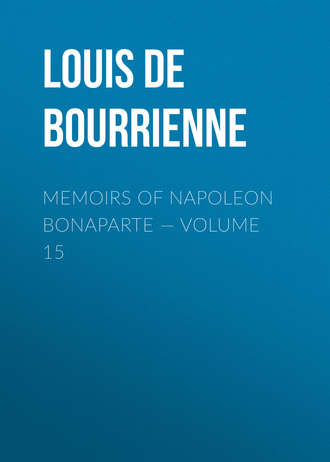
Louis de Bourrienne
Memoirs of Napoleon Bonaparte — Volume 15
In September 1815 the elections to the Chamber were bringing in deputies more Royalist than the King, and Talleyrand sought to gain popularity by throwing over Fouche. To his horror it appeared that, well contented with this step, the deputies next asked when the former Bishop was to be dismissed. Taking advantage of what Talleyrand conceived to be a happy way of eliciting a strong expression of royal support by threatening to resign, the King replaced him by the Duc de Richelieu. It was well to cut jokes at the Duke and say that he was the man in France who knew most of the Crimea (the Duke had been long in the Russian service, with the approval of Napoleon), but Talleyrand was overwhelmed. He received the same office at Court which he had held under Napoleon, Grand Chamberlain, and afterwards remained a sardonic spectator of events, a not unimposing figure attending at the Court ceremonials and at the heavy dinners of the King, and probably lending a helping hand in 1830 to oust Charles X. from the throne. The Monarchy of July sent him as Ambassador to England, where he mixed in local politics, for example, plotting against Lord Palmerston, whose brusque manners he disliked; and in 1838 he ended his strange life with some dignity, having, as one of his eulogists puts it, been faithful to every Government he had served as long as it was possible to save them.
With the darker side of Talleyrand's character we have nothing to do here; it is sufficient for our purposes to say that the part the leading statesman of France took during the Cent Tours was simply nil. In 1814, he had let the reins slip through his hands; 1815 he could only follow the King, who even refused to adopt his advice as to the proper way in which to return to France, and though he once more became Chief Minister, Talleyrand, like Louis XVIII., owed his restoration in 1815 solely to the Allies.
The Comte d'Artois, the brother of the King, and later King himself as Charles X., was sent to Lyons, to which place the Duc d'Orleans followed him, and where the two Princes met Marshal Macdonald. The Marshal did all that man could do to keep the soldiers true to the Bourbons, but he had to advise the Princes to return to Paris, and he himself had to fly for his life when he attempted to stop Napoleon in person. The Duc d'Orleans was then sent to the north to hold Lille, where the King intended to take refuge, and the Comte d'Artois remained with the Court.
The Court was very badly off for money, the King, and Clarke, Duke of Feltre, the War Minister, were the only happy possessors of carriages. They passed their time, as the Abbe Louis once bitterly remarked, in saying foolish things till they had a chance of doing them.
The Comte d'Artois, who, probably wisely, certainly cautiously, had refused to go with De Vitrolles to stir up the south until he had placed the King in safety, had ended by going to Ghent too, while the Duc de Berry was at Alost, close by, with a tiny army composed of the remains of the Maison du Roi, of which the most was made in reports. The Duc d'Orleans, always an object of suspicion to the King, had left France with the Royal party, but had refused to stay in Belgium, as he alleged that it was an enemy's country. He crossed to England where he remained, greatly adding to the anxiety of Louis by refusing to join him.
The end of these Princes is well known. Louis died in 1824, leaving his throne to his brother; but Charles only held it till 1830, when after the rising called "the three glorious days of July," he was civilly escorted from France, and took shelter in England. The Due Angouleme died without issue. The Duc de Berry was assassinated in 1820, but his widow gave birth to a posthumous son the Duc de Bordeaux, or, to fervid Royalists, Henri V., though better known to us as the Comte de Chambord, who died in 1883 without issue, thus ending the then eldest line of Bourbons, and transmitting his claims to the Orleans family. On the fall of Charles X. the Duc d'Orleans became King of the French, but he was unseated by the Revolution of 1848, and died a refugee in England. As the three Princes of the House of Conde, the Prince de Conde, his son, the Duc de Bourbon, and his: grandson, the Due d'Enghien, all died without further male issue, that noble line is extinct.
When the news of the escape of Napoleon from Elba reached Vienna on the 7th of March 1815, the three heads of the Allies, the Emperors of Austria and Russia, and the King of Prussia, were still there. Though it was said that the Congress danced but did not advance, still a great deal of work had really been done, and the news of Napoleon's landing created a fresh bond of union between the Allies which stopped all further chances of disunion, and enabled them to practically complete their work by the 9th of June 1815, though the treaties required cobbling for some years afterwards.
France, Austria, and England had snatched the greater part of Saxony from the jaws of Prussia, and Alexander had been forced to leave the King of Saxony to reign over half of his former subjects, without, as he wished, sparing him the pain of such a degradation by taking all from him. Russia had to be contented with a large increase of her Polish dominions, getting most of the Grand-Duchy of Westphalia. Austria had, probably unwisely, withdrawn from her former outlying provinces in Swabia and the Netherlands, which had before the Revolution made her necessarily the guardian of Europe against France, preferring to take her gains in Italy, gains which she has gradually lost in our days; while Prussia, by accepting the Rhine provinces, completely stepped into the former post of Austria. Indeed, from the way in which Prussia was, after 1815, as it were, scattered across Germany, it was evident that her fate must be. either to be crushed by France, or else, by annexing the states enclosed in her dominions, to become the predominating power in Germany. It was impossible for her to remain as she was left.
The Allies tightly bound France. They had no desire to have again to march on Paris to restore Louis to the subjects who had such unfortunate objections to being subjected to that desirable monarch. By the second Treaty of Paris, on the 20th of November 1815, France was to be occupied by an Allied force, in military positions on the frontier, not to exceed 150,000 men, to be taken from all the Allied armies, under a commander who was eventually the Duke of Wellington. Originally the occupation. was not to exceed five years, but in February 1817 the army was reduced by 30,000 men, one-fifth of each contingent; and by the Treaty of Aix-la- Chapelle of 9th October 1818, France was to-be evacuated by the 30th of November 1818.
The three monarchs were probably not sorry to get the Congress over on any terms. Alexander had had his fill of displaying himself in the salons in his favourite part of an Agamemnon generous towards Troy, and he had worn out his first popularity. He was stung by finding some of his favourite plans boldly opposed by Talleyrand and by Metternich, and, indeed, was anxious to meet the last in open combat. Francis had required all the firmness of what he called his Bohemian head to resist the threats, entreaties, and cajoleries employed to get him to acquiesce in the dethronement of the King of Saxony, and the wiping out of the Saxon nationality by the very alliance which professed to fight only for the rights of nations and of their lawful sovereigns.
All three monarchs had again the satisfaction of entering Paris, but without enjoying the full glories of 1814. "Our friends, the enemies" were not so popular then in France, and the spoliation of the Louvre was not pleasant even to the Royalists. The foreign monarchs soon returned to their own drained and impoverished States.
The Emperor Francis had afterwards a quiet reign to his death in 1835, having only to assist his Minister in snuffing out the occasional flashes of a love of freedom in Germany.
The King of Prussia returned in a triumph well won by his sturdy subjects, and, in the light of his new honours, the Countess Von Voss tells us he was really handsome. He was now at leisure to resume the discussions on uniform, and the work of fastening and unfastening the numerous buttons of his pantaloons, in which he had been so roughly interrupted by Jena. The first institution of the Zollverein, or commercial union with several States, gradually extended, was a measure which did much for the unification of Germany. With his brother sovereigns he revisited Paris at the end of the military occupation in 1818, remaining there longer than the others, "because," said the Parisians, "he had discovered an actor at a small theatre who achieved the feat of making him laugh." He died in 1840. His Queen—heartbroken, it was said—had died in 1810.
Alexander was still brimming over with the best and most benevolent intentions towards every one. The world was to be free, happy, and religious; but he had rather vague ideas as to how his plans were to be carried out. Thus it is characteristic that when his successor desired to have a solemn coronation as King of Poland it was found that Alexander had not foreseen the difficulties which were met with in trying to arrange for the coronation of a Sovereign of the Greek Church as King of a Roman Catholic State. The much-dreaded but very misty Holy Alliance was one of the few fruits of Alexander's visions. His mind is described as passing through a regular series of stages with each influence under which he acted. He ended his life, tired out, disillusioned, "deceived in everything, weighed down with regret;" obliged to crush the very hopes of his people he had encouraged, dying in 1825 at Taganrog, leaving his new Polish Kingdom to be wiped out by-his successors.
The minor sovereigns require little mention. They retained any titles they had received from Napoleon, while they exulted, at being free from his heavy hand and sharp superintendence. Each got a share, small or great, of the spoil except the poor King of Denmark, who, being assured by Alexander on his departure that he carried away all hearts, answered, "Yes, but not any souls."
The reintroduction of much that was bad in the old system (one country even going so far as to re-establish torture), the steady attack on liberty and on all liberal ideas, Wurtemberg being practically the only State which grumbled at the tightening of the reins so dear to Metternich,—all formed a fitting commentary on the proclamations by which the Sovereigns had hounded on their people against the man they represented as the one obstacle to the freedom and peace of Europe. In gloom and disenchantment the nations sat down to lick their wounds: The contempt shown by the monarchs for everything but the right of conquest, the manner in which they treated the lands won from Napoleon as a gigantic "pool" which was to be shared amongst them, so many souls to each; their total failure to fulfil their promises to their subjects of granting liberty,—all these slowly bore their fruits in after years, and their effects are not even yet exhausted. The right of a sovereign to hold his lands was now, by the public law of Europe, to be decided by his strength, The rights of the people were treated as not existing. Truly, as our most gifted poetess has sung—
"The Kings crept out—the peoples sat at home,
And finding the long invocated peace
(A pall embroidered with worn images
Of rights divine) too scant to cover doom
Such as they suffered, nursed the corn that grew
Rankly to bitter bread, on Waterloo."







